Veterinary staff in O Mon district vaccinate dogs against rabies at a household.
Proactively prevent disease for pets
Many households raising livestock and poultry in Can Tho City said that in order to reduce risks in livestock farming due to the appearance and damage caused by diseases, people have paid attention to strictly implementing the recommendations of the veterinary sector and functional agencies to ensure biosafety and disease safety. Pay attention to designing and building suitable barns and implementing solutions to ensure environmental hygiene, limiting people entering and leaving barns. Strictly manage the farming process to avoid the risk of livestock being infected with diseases, and vaccinate livestock to prevent diseases.
Mr. Luu Minh Bao in Truong Lac ward, O Mon district, Can Tho city, currently has a herd of more than 50 pigs for meat and 7 parent pigs for breeding. He said: "I have been involved in pig farming for many years. In the past, my herd suffered heavy losses due to disease, so I pay great attention to disease prevention, especially vaccination and following the recommendations of the relevant authorities on regular disinfection of pig farms. Ensuring hygiene and limiting the entry of strangers into the farm area. Thanks to that, in recent years, my herd of pigs has developed quite stably and has not contracted diseases such as foot and mouth disease, blue ear disease, diarrhea caused by E. coli, septicemia or paratyphoid...". According to the Department of Animal Husbandry and Veterinary Medicine under the Department of Agriculture and Environment (DARD) of Can Tho City, the city currently has a herd of 128,171 pigs, 3,688 cows, 254 buffaloes, more than 2.2 million poultry, and about 47,687 cats and dogs.
Nowadays, raising many types of livestock and poultry has made much progress, people have less trouble than before and the efficiency of raising livestock has also been improved thanks to the application of scientific and technical advances in raising livestock and the use of ready-made feed. However, livestock raising activities still face many difficulties because the output prices of many types of livestock are not stable and there is a risk of damage due to the appearance and complicated developments of many dangerous diseases. What is more worrying is that many diseases from livestock can spread to humans, threatening human health and life. There are a series of dangerous diseases in livestock and poultry such as avian influenza, foot and mouth disease, lumpy skin disease in livestock, African swine fever, blue ear pig and rabies in dogs and cats. According to Mr. Huynh Van Nghi in Chau Van Liem ward, O Mon district, rabies in dogs and cats is a very dangerous disease because it can be transmitted to humans and there is no cure. To prevent disease, dogs and cats need to be vaccinated regularly and anyone who is bitten by a dog or cat needs to be vaccinated immediately. In the past, when raising dogs, his family always followed the vaccination schedule and did not let the dogs roam freely on the street to avoid the risk of dog bites and danger to passersby.
Support people
In order to protect livestock and prevent dangerous diseases transmitted from animals to humans, in recent times, the Department of Agriculture and Environment has actively promoted information, propaganda, training and support activities for people to replicate and develop effective and disease-safe livestock models. At the same time, coordinate with relevant departments, branches, localities and units to synchronously and effectively deploy solutions to prevent and control livestock and poultry diseases according to the instructions, programs and plans of the Central and the city. Pay attention to organizing vaccination with high coverage rates, effectively protecting livestock and stabilizing production development. Promote the leadership role of local authorities, departments, branches and people's responsibilities in implementing vaccination to protect livestock and develop stably, avoid disease risks causing economic losses, as well as prevent diseases transmitted from animals to humans that threaten human health and life. Thereby, contributing to improving livestock farming efficiency, ensuring food safety and hygiene, ecological environment, people's health and socio-economic development.
With the goal of vaccinating livestock to create active immunity against dangerous diseases, Can Tho City strives for the livestock vaccination rate in 2025 to reach over 80% of the livestock subject to vaccination and ensure vaccination is done in accordance with the prescribed procedures, techniques and time. For rabies vaccination for dogs and cats, it strives to ensure vaccination of at least over 80% of the total dog and cat population in each locality. According to the Department of Agriculture and Environment of Can Tho City, livestock vaccination in 2025 in Can Tho will be carried out in 2 main phases, including phase 1 from April 25 to June 15 and phase 2 from August to November 2025. In addition to the above vaccinations, the Department of Agriculture and Environment assigned the Department of Animal Husbandry and Veterinary Medicine to coordinate with localities to regularly review and carry out additional vaccinations for newly raised livestock, places where vaccination has not met requirements, livestock herds that have expired their immunity period, or when requested by livestock farmers.
To effectively implement livestock vaccination in 2025, Mr. Nguyen Tan Nhon, Deputy Director of the Department of Agriculture and Environment of Can Tho City, suggested: "The Department of Animal Husbandry and Veterinary Medicine coordinates with localities to promote propaganda and drastically implement vaccination for livestock to farmers. People's Committees of districts and towns in the city pay attention to directing communes, wards and functional units in the locality to actively participate in implementing vaccination work. Instruct livestock farmers to ensure disease safety, biosafety and comply with regulations on ensuring food safety and maintaining environmental hygiene. Note that people raising dogs and cats must be vaccinated against rabies to avoid the risk of rabies in animals and humans...". According to Mr. Nhon, vaccination is the most important and effective measure to prevent diseases in livestock without too much cost. People need to raise awareness of vaccination for livestock to avoid economic losses, protect sustainable livestock farming, and protect their own health and the health of the community.
Article and photos: KHANH TRUNG
Source: https://baocantho.com.vn/nhieu-giai-phap-phat-trien-chan-nuoi-an-toan-ben-vung-a186202.html


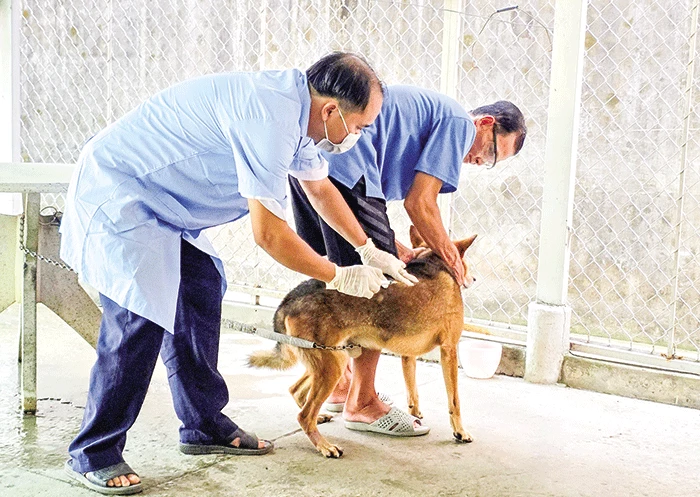
![[Photo] Top players gather at the 2025 Nhan Dan Newspaper National Table Tennis Championship](https://vphoto.vietnam.vn/thumb/1200x675/vietnam/resource/IMAGE/2025/5/23/9ad5f6f4faf146b08335e5c446edb107)





















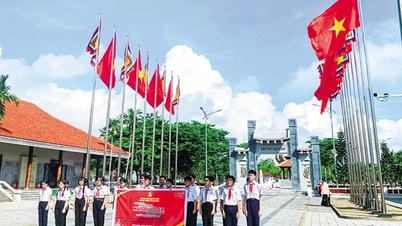
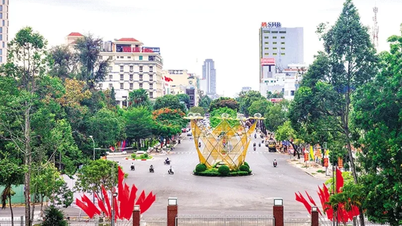
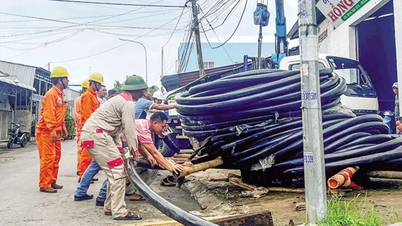
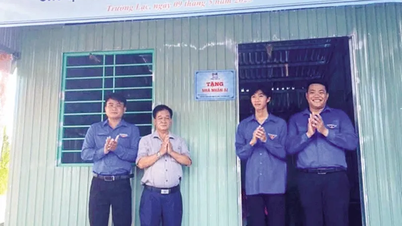






























































Comment (0)